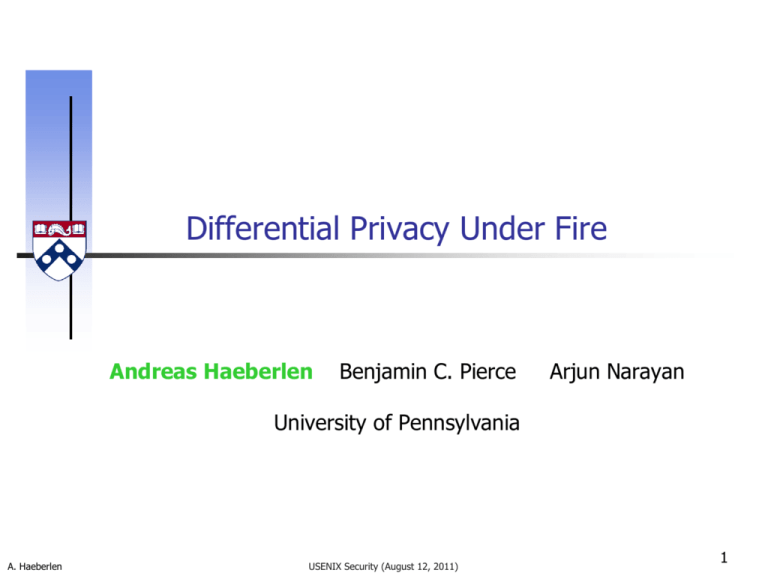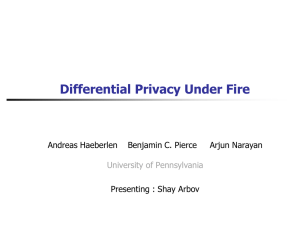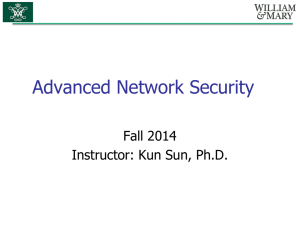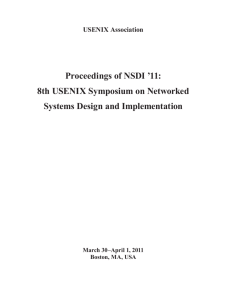Differential Privacy Under Fire
advertisement

Differential Privacy Under Fire
Andreas Haeberlen
Benjamin C. Pierce
Arjun Narayan
University of Pennsylvania
A. Haeberlen
USENIX Security (August 12, 2011)
1
Motivation: Protecting privacy
Better recommendations?
#1
Alice
#2
Bob
#3
Cindy
Dave
#4
Eva
#5
...
(Star Wars, 5)
(Godfather, 1)
(Die Hard, 4)
(Avatar, 5)
(Amélie, 4)
(Alien, 4)
(Porn, 5)
(Toy Story, 2)
(Gandhi, 4)
(Rocky, 1)
Does Bob
watch porn?
Data
I know Bob
hates 'Godfather'
Lots of potentially useful data exists
But: Releasing it can violate privacy!
A. Haeberlen
We can try to anonymize/scrub it…
… but this can go horribly wrong (see Netflix, AOL, …)
USENIX Security (August 12, 2011)
2
Promising approach: Differential privacy
Noise
Alice
Bob
Cindy
Dave
Eva
...
(Star Wars, 5)
(Godfather, 1)
(Die Hard, 4)
(Avatar, 5)
(Amélie, 4)
(Alien, 4)
(Porn, 5)
(Toy Story, 2)
(Gandhi, 4)
(Rocky, 1)
?!?
Private data
Idea: Use differential privacy [Dwork et al.]
A. Haeberlen
Only allow queries; add a certain amount of noise to results
[lots of mathematical details omitted]
Result: Strong, provable privacy guarantees
Implemented, e.g., by PINQ [McSherry] and Airavat [Roy et al.]
USENIX Security (August 12, 2011)
3
Differential Privacy under Fire
Alice
Bob
Cindy
Dave
Eva
...
(Star Wars, 5)
(Godfather, 1)
(Die Hard, 4)
(Avatar, 5)
(Amélie, 4)
(Alien, 4)
(Porn, 5)
(Toy Story, 2)
(Gandhi, 4)
(Rocky, 1)
Private data
(noised response)
YES
Devastating effect on privacy guarantees
Usual defenses are not strong enough (can't leak even one bit!)
We show:
A. Haeberlen
(special query)
What if the adversary uses a covert channel?
Does Bob
watch porn?
Working attacks
An effective (domain-specific) defense
USENIX Security (August 12, 2011)
4
Outline
A. Haeberlen
Motivation
Differential Privacy primer
Attacks on PINQ and Airavat
Our defense
The Fuzz system
Evaluation
USENIX Security (August 12, 2011)
NEXT
5
Background: Queries
noisy sum, foreach r in db, of {
if (r.score("Godfather")>4)
then return 1
else return 0
}
?
Microquery
Data
Queries are programs
These programs have a specific structure
A. Haeberlen
PINQ is based on C#, Airavat on MapReduce
Some overall program logic, e.g., aggregation
Some computation on each database row (microquery)
USENIX Security (August 12, 2011)
6
Background: Sensitivity
noisy sum, r in db, of {
if (r.score("Godfather")>4)
then return 1
else return 0
}
noisy sum, r in db, of {
if (r.score("Godfather")>4)
then return 1200
else return 200
}
Sensitivity 1,000
Sensitivity 1
How much noise should we add to results?
A. Haeberlen
Depends on how much the output can change if we add or
remove a single row (the sensitivity of the query)
USENIX Security (August 12, 2011)
7
Background: Privacy budget
Query
Privacy
budget
noisy sum, r in db, of {
if (r.score("Godfather")>4)
then return 1
else return 0
}
Answer
Data
How many queries should we answer?
A. Haeberlen
Set up a privacy 'budget' for answering queries
Deduct a 'cost' for each query, depending on 'how private' it is
USENIX Security (August 12, 2011)
8
Covert-channel attacks
noisy sum, foreach r in db, of {
if (r.name=="Bob" && r.hasRating("Porn"))
then {
expensive_subquery();
loop(1 second);
b=1;
};
return b
0
}
The above query...
Other channels we have exploited:
A. Haeberlen
... is differentially private (sensitivity zero)
... takes 1 second longer if the database contains Bob's data
Result: Adversary can learn private information with certainty!
Privacy budget
Global state
USENIX Security (August 12, 2011)
9
Our attacks work in practice
Both PINQ and Airavat are vulnerable
What went wrong?
A. Haeberlen
The authors were aware of this attack vector
Both papers discuss some ideas for possible defenses
But: Neither system has a defense that is fully effective
USENIX Security (August 12, 2011)
10
Short-range channels
Threat model
Memory
Electromagnetic
consumption
radiation
Light
Query completion
time
Query
Answer
Power
Cache
usage
Sound
Privacy
budget
Too many channels!! Is it hopeless?
Reasonable assumption: Querier is remote
This leaves just three channels:
A. Haeberlen
The actual answer to the query
The time until the answer arrives
The decision whether the remaining budget is sufficient
USENIX Security (August 12, 2011)
11
Our approach
We can close the remaining channels completely
through a combination of systems and PL techniques
Language design rules out state attacks etc.
A. Haeberlen
Details
in the
paper
Program analysis closes the budget channel
Example: Simply don't allow global variables!
Idea: Statically determine the 'cost' of a query before running it
Uses a novel type system [Reed and Pierce]
Special runtime to close the timing channel
USENIX Security (August 12, 2011)
NEXT
12
Plugging the timing channel
How to avoid leaking information via query
completion time?
Our approach: Make timing predictable
A. Haeberlen
Could treat time as an additional output
But: Unclear how to determine sensitivity
If time does not depend on the contents of the database,
it cannot leak information
USENIX Security (August 12, 2011)
13
Timeouts and default values
Querier specifies for each microquery:
Each time the microquery processes a row:
A. Haeberlen
a timeout T, and
a default value d
If completed in less than T, wait
If not yet complete at T, abort and proceed to next row
USENIX Security (August 12, 2011)
14
Example: Timeouts and default values
Alice
Rob
Bob
Cindy
Dave
Eva
(Star Wars, 5)
(Godfather, 1)
(Die Hard, 4)
(Avatar, 5)
(Amélie, 4)
(Alien, 4)
(Porn, 5)
(Toy Story, 2)
(Gandhi, 4)
(Rocky, 1)
noisy sum, rdb, of {
if r.name=="Bob"
then loop(1 sec);
return 0
}, T=20ms, d=1
Bob not in db:
0 0 0 0 0
Bob in db:
0
0 0 0
0
20ms
A. Haeberlen
Bob not in db:
0
Bob in db:
0
sum=0
Time
sum=0
Observable
0
1
0
0
0
0
0
0
USENIX Security (August 12, 2011)
sum=0
Time
sum=1
15
Default values do not violate privacy
Bob not in db:
0
Bob in db:
0
0
0
0
0
0
Remember that the answer is still noised before it is returned
Noise depends on the sensitivity, which is now 1
It's just as if we had written "If r.name=='Bob', return 1"
Impact on non-adversarial queriers?
A. Haeberlen
1
0
Don't default values change the query's answer?
Yes, but that's okay:
0
noisy sum, rdb, of {
if r.name=="Bob"
then loop(1 sec);
return 0
}, T=20ms, d=1
Default value is never included if timeout is sufficiently high
USENIX Security (August 12, 2011)
16
Outline
A. Haeberlen
Motivation
Differential Privacy primer
Attacks on PINQ and Airavat
Our defense
The Fuzz system
Evaluation
NEXT
USENIX Security (August 12, 2011)
17
The Fuzz system
Fuzz: A programming language for writing
differentially private queries
Runtime supports timeouts + default values
A. Haeberlen
Designed from scratch Easier to secure
Functionality roughly comparable to PINQ/Airavat
Novel type system for statically checking sensitivity
Turns out to be highly nontrivial
Problem: How to make a potentially adversarial computation
take exactly a given amount of time?
Uses a new primitive called predictable transactions
USENIX Security (August 12, 2011)
18
Predictable transactions
Isolation: Microquery must not interfere with
the rest of the computation in any way
Preemptability: Must be able to abort
microqueries at any time
A. Haeberlen
Even in the middle of memory allocation, ...
Bounded deallocation: Must be able to free any
allocated resources within bounded time
Examples: Trigger garbage collector, change runtime state, ...
Example: Microquery allocates lots of memory, acquires locks...
Details are in the paper
USENIX Security (August 12, 2011)
19
Outline
Motivation
Differential Privacy primer
Attacks on Differential Privacy
Defenses
The Fuzz system
Evaluation
NEXT
A. Haeberlen
Is Fuzz expressive enough to handle realistic queries?
Is Fuzz fast enough to be practical?
Does Fuzz effectively prevent side-channel attacks?
More experiments are described in the paper
USENIX Security (August 12, 2011)
20
Experimental setup
Implemented three queries from prior work:
Also crafted several adversarial queries
Using different variants of our attacks
Evaluated on a commodity system
A. Haeberlen
K-means clustering (inspired by Blum et al., PODS'05)
Census query (inspired by Chawla et al., TCC'05)
Web server log analysis (inspired by Dwork et al., TCC'06)
Fuzz is expressive enough to run all three queries
3GHz Core 2 Duo running Linux 2.6.38
Synthetic database with 10,000 rows
USENIX Security (August 12, 2011)
21
Query completion time (s)
Performance: Non-adversarial queries
Original runtime
12
Fuzz (no padding)
10
Due to
padding
8
6
4
2.5x
2
0
kmeans
census
Fuzz
3.4x
weblog
But: Most expensive query took 'only' 12.7s
Most of the increase was due to time padding
A. Haeberlen
6.8x
Query completion time increased by 2.5x-6.8x
14
Timeouts were set conservatively
More detailed results are in the paper
USENIX Security (August 12, 2011)
22
Performance: Adversarial queries
# Attack type
0.32s
1.6s
1.10s
1.10s <1ms
2 Garbage collection
1.57s
0.32s
1.2s
1.10s
1.10s <1ms
3 Artificial delay
1.62s
0.32s
1.3s
1.10s
1.10s <1ms
26.37s 26.38s
6ms
1.10s
1.10s <1ms
1.3s
2.40s
2.40s <1ms
2.17s
0.90s
Evaluated five adversarial queries
Unprotected runtime: Attacks cause large timing variation
Protected runtime: Completion times are extremely stable
Timing channel now too narrow to be useful!
A. Haeberlen
D
1.96s
5 Artificial delay
Protected
Hit
Miss
1 Memory allocation
4 Early termination
Protection disabled
Hit
Miss
D
Remember: State and budget channels closed by design
USENIX Security (August 12, 2011)
23
Summary
Differentially private query processors must
be protected against covert-channel attacks
Leaking even a single bit can destroy the privacy guarantees
Vulnerabilities exist in PINQ and Airavat
Proposed defense: Fuzz
Uses static analysis and predictable transactions
Specific to differential privacy, but very strong: Closes all
remotely measurable channels completely
More information at: http://privacy.cis.upenn.edu/
A. Haeberlen
USENIX Security (August 12, 2011)
24





